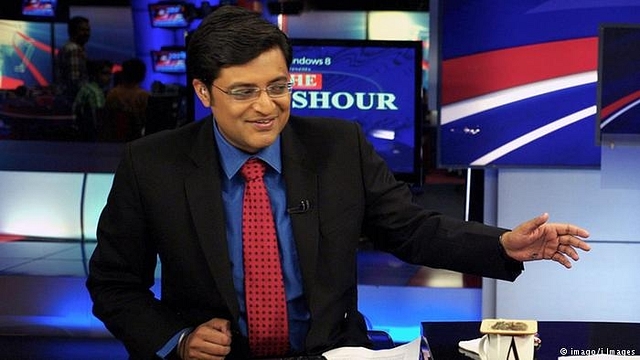
What The Nation Wants To Know
We all hate Times Now, in particular the show Newshour. But admit it, we all watch it, too. And that is what matters in market dynamics. Here is how it works.
A television channel normally pays Rs 2,500 to a panelist for every appearance. Times Now pays Rs 5,000, which ‘lesser’ channels can’t afford.
It is therefore that you see some faces bearing with humiliation every night, and yet grinning and bearing it. But given that there is no dearth of shameless creatures in society, who decides who gets to earn Rs 5,000 night after night?
“A PR agency in some cases,” revealed a member of the BJP’s national executive who is a regular on Hindi news channels but who is not designated as a spokesperson. “Vijender Gupta (of the Delhi BJP) suffers from an inferiority complex because he is inarticulate and uncomfortable with English. Some years ago he noticed this young doctor whose polemics impressed him. Taking him into confidence for the job, he started sending Sambit Patra to small-time Hindi language channels that used to invite him.”
But these channels were not big enough to create a political impact. So Gupta hired a public relations firm for a monthly fee of Rs 8 lakh, against which they were supposed to plant Patra in all English channels, informed the insider.
Viewers of Times Now must have wondered who the hell creatures like a certain Rahul Narvekar are, who appears nowhere other than this channel. That his regular appearance was not affected when he defected from the Shiv Sena and went to the NCP is indication of the fact that the party is not important in the said channel’s scheme of things. The deal is with particular faces.
Some of these faces, however, worked their own way up. The one the right wing hates is Sanjay Jha. He emerged on the scene at a time when the Congress’s regular spokespersons were too embarrassed to further apologies every evening for a plethora of scandals self-revealing at an alarming rate under the UPA government. That was when Jha arrogated upon himself the ‘responsibility’ of defending the beleaguered grand old party as owner of a Hamara Congress dotcom website.
At this juncture, our readers must empathize with the plight of a channel’s crew, especially the guest coordinator. While no Congressman was ready to come clean on CWG, 2G, coal scams, the coordinator desperately needed to fill the slot to complete the panel. That’s how Jha’s career took off.
Where you should not have any sympathy for the guest coordinator, each of these office bearers in every studio run a racket of mutual favours, of which all these regular faces on TV are players.
But there is a tacit code of conduct to keep the cosy compact. Times Now is Goswami’s show, and you can’t dare dominate the proceedings. Telling the anchor that he is a liar and a fool like Subramanian Swamy did, or telling him that his show couldn’t affect five votes of a politician, as Kailash Vijayvargiya said in his sole appearance, or calling him a disgrace to journalism as Ved Pratap Vaidik did is blasphemy. You will never be invited to participate in a debate by the channel thereafter.
Also, be dramatic. Don’t give two hoots to decency or etiquette when the person you are arguing with is not the boss in the show. Butt in whenever you like. Or speak in Hindi brazenly like Kumar Vishwas or hesitatingly like Sudhanshu Trivedi in the English show.
TRP is the mantra. Times Now sells because it yells at everybody — a huge departure from a Barkha Dutt giggling at Arvind Kejriwal’s rhetoric. Never mind that NDTV’s advertisement dismisses the rival as a tabloid. A voyeuristic society loves watching daily squabbles. Observe one in your neighbourhood, or one in the city, if you don’t believe me. And such a society is the market today.
Bennett, Coleman and Company’s channel also has the USP of its journalists not having relations as baggage. By the time it was launched, the audience was exasperated with watching the channel run by Brinda Karat’s sister for more than a decade, first as Star News’ production house and then as an independent media house.
Elsewhere in that leftist media house, Rajdeep Sardesai sulked, complaining why he was given a salary less than that of Vikram Chandra when he did more significant work. That his father-in-law Bhaskar Ghose had helped the channel tide over the scandal of charging Doordarshan for footage Doordarshan itself had produced was a fact NDTV was not ready to be grateful for on the face of constant office politics between Chandra, Dutt and Sardesai. So the complaining guy moved to the then newly formed CNN-IBN as its chief editor. But he managed to make the new media house nothing more than a me-too NDTV. Times Now’s USP stayed intact.
Here, curiously, like Goswami’s purported editorial line, his familial relations are equally ‘balanced’! His paternal grandfather, Rajani Kanta Goswami, was a lawyer and Congress leader. His maternal grandfather, Gauri Sankar Bhattacharya, the Leader Of The Opposition in Assam for many years, was a writer and a recipient of the Asam Sahitya Sabha Award. Arnab Goswami’s father is Col Manoranjan, a BJP member who contested the 1998 Lok Sabha Polls as the party’s candidate for the Guwahati Lok Sabha seat in Assam.
Yes, these relations could be seen as serious cases of conflicts of interest. But since journalists decide who is morally right and wrong, who will put them through a public trial? If they were really honest, wouldn’t they make these connections public? The nation wants to know.